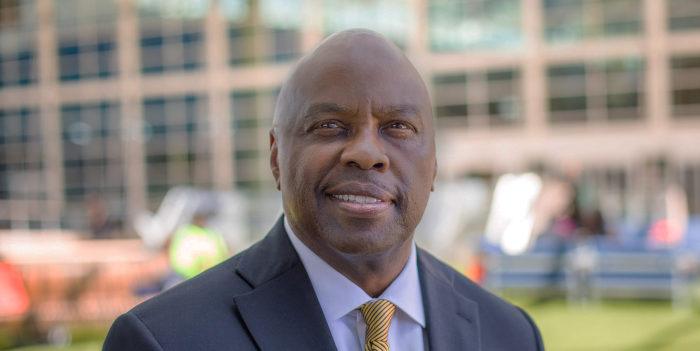Phil Washington grew up on the South Side of Chicago in public housing with a single mom caring for a family of six. “The people building infrastructure in my community did not look like me,” he says. “I wondered, ‘Why can’t I get a job helping to build my own community?’”
Washington instead went first into the U.S. Army. He then rose to a top job at Denver’s Regional Transportation District, where he was an ENR newsmaker for innovation in 2014, and then secured the post of CEO at the Los Angeles County Metropolitan Transportation Authority. In 2020, he was named to the Biden-Harris transition team working on transportation policy and helped draft the executive order around infrastructure equity that President Biden signed on his first day in office. “We began to think about how to operationalize that executive order,” Washington said at ENR’s Los Angeles Infrastructure Forum last November.
The Pledge
Working with John Porcari, former deputy secretary of the U.S. Dept. of Transportation, the idea emerged for what Washington calls “a coalition of the willing” and the creation of the nonprofit called the Equity in Infrastructure Project. The program invites leaders of transit authorities, airports, ports, water districts, engineering and construction firms and building trades councils to pledge action on driving contracting opportunities for Historically Underutilized Businesses. The movement now has 56 signatories in 17 states, the District of Columbia and Puerto Rico—45 of which signed in 2023. Porcari, who calls Washington a “model public servant,” adds that the program helps build “bridges to the middle class” by helping firms win prime contracts—contracts that allow them to reinvest in jobs in their underserved communities while expanding construction’s workforce. Signatories commit to measuring how many prime contracts they awarded to HUBs before and how many they award after joining.
Washington, who became CEO of the Denver International Airport in 2021, points out that the effort comes at a time of historic infrastructure spending, both through federal legislation and local and state funding. “When you think of the potential spend and capital programs of the pledge signers so far and those who will pledge—we’re looking at probably a trillion dollars,” he says.
Dorval Carter, president of the Chicago Transit Authority, was one of the original group of signatories in 2022, along with Washington, signing for DIA. Washington is a charismatic leader—“the epitome of someone who is committed to making a difference,” Carter says. Both have examples of translating the pledge into action. Carter creates a “ladder of opportunity” with training and mentorship, sizing jobs so HUBs can be successful at winning and executing prime contracts. At DIA, Lisa Buckley, CEO of American Automation Services, a certified MWBE contractor, says winning a $5-million prime contract means “more risk but more reward.” Thanks to leaders like Washington and others, she says, “we had a level playing field and were able to execute. It allowed us to double our business.”
Dwight Pullen, Jr., SVP and global aviation leader at AECOM, speaks to the role of engineers and contractors who sign: “The pledge is completely aligned with our ESG framework, especially social value-based procurement, including promoting supplier diversity.” Washington truly cares about people who do not have a voice, Pullen adds. “We’re challenging the norms to make the industry better.”
